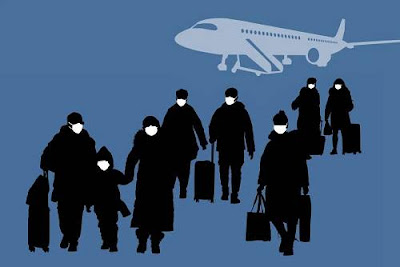China's domestic tourism market plummeted in the third quarter, blocking the recovery momentum in the first half of this year. The reason was that inter-provincial tourism was suspended due to the intermittent reports of COVID cases.

According to the Ministry of Culture and Tourism, the number of domestic tourists in the third quarter fell by 18.3% year-on-year, while the growth rates in the first and second quarters were 247.1% and 33%, respectively.
Due to the strong performance in the first two quarters of this year, the total domestic tourist arrivals from January to September increased by 39.1% year-on-year to 2.689 billion.
Experts familiar with the Chinese culture and tourism industry said: "If the tourism situation in the next two months can reach the level of last year, it will be a fairly optimistic forecast."
The expert pointed out that there are no public holidays in the rest of this year, which aggravates the problems faced by winter tourism. Coupled with the fact that the COVID pandemic has not yet been completely eliminated, a recovery in the fourth quarter is unlikely.
Wang Ke, a travel analyst at Analysys Consulting, also agreed, saying that from a seasonal perspective, "the numbers in the fourth quarter will not be very good."
Due to restrictions on inter-provincial travel, some travel agencies were forced to suspend operations and cut costs in the third quarter, while others increased short-distance tours or set foot in business and conference travel to make ends meet.
Chen Muxiang used to work in one of Xiamen's largest travel agencies, but after the outbreak of the Delta strain on the eve of the Mid-Autumn Festival in September, she started selling tea.
"Everyone is trying desperately," she said, "all we can do now is wait."
Since September, Chen Muxiang has not seen any improvement in Xiamen's tourism industry, including during the "Golden Week" during the National Day holiday in early October.
According to financial reports, at least 12 listed travel agencies recorded losses in their net profits in the first three quarters of this year.
Caesars Travel and Zhongxin Travel announced a merger in June to combat the harsh winter tourism market, but still lost 464 million yuan in the first three quarters of this year.
"Compared with other participants in the tourism industry, travel agencies have suffered the most, partly because this form of service is becoming more and more outdated." Wang Ke of Analysys said.
Wang Ke said: "They appeared to solve the information asymmetry between travel providers and tourists. However, as economic development has narrowed the information gap, there is not much need for travel agencies to exist."
However, relative to the decline in inter-provincial travel, there are still some positive aspects, and local tourism in some areas is still active.
Xu Jun of Nanjing Tourism Group said that since this summer, local consumption in Nanjing has surged, and the popularity of local performances and entertainment activities has risen.
"People cannot travel long distances, so they can only consume locally," she said.
The opening of Universal Studios Beijing has also brought a large number of tourists to the capital and boosted local consumption.
A report from AVIC Securities said: "In the short term, the epidemic is likely to occur again in the autumn and winter seasons, and tourism companies have to make adjustments."
The report said: "But in the long run, these disturbances will promote the adjustment and structural upgrade of the industry."




No comments:
Post a Comment